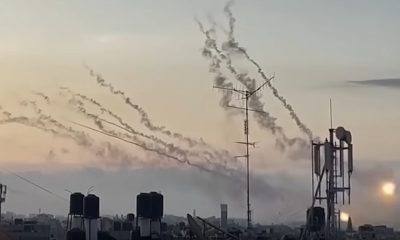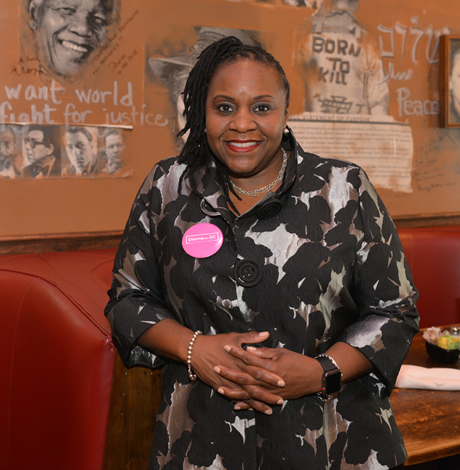Local
Comings & Goings
Bussey-Reeder to lead Far Southeast Family Strengthening Collaborative
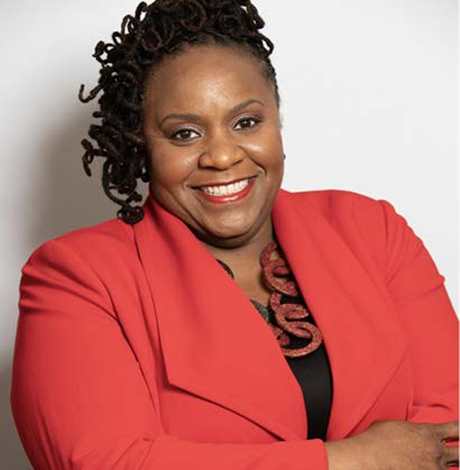
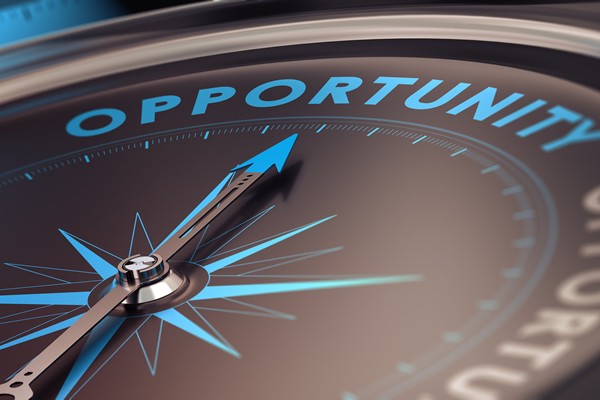
The Comings & Goings column is about sharing the professional successes of our community. We want to recognize those landing new jobs, new clients for their business, joining boards of organizations and other achievements. Please share your successes with us at: [email protected].
The Comings & Goings column also invites LGBTQ+ college students to share their successes with us. If you have been elected to a student government position, landed an exciting internship, or are graduating and beginning your career with a great job, let us know so we can share your success.
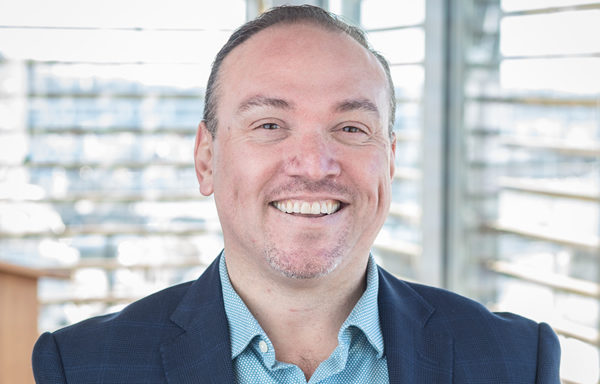
Congratulations to Orlando Gonzales who has been appointed the new executive director of SAVE, the organization that has served the South Florida LGBTQ community for more than 25 years.
Board of directors chair Elizabeth Regalado said, “We feel very fortunate and proud to have Orlando back at SAVE as the organization’s executive director. His background, vision, unique experience, and passion for advocacy work are emblematic of the work SAVE has led for the South Florida LGBTQ+ community for more than 25 years.”
Upon his appointment Gonzales said, “I’m thrilled to be returning to Miami, because I care deeply about the mission of the organization and the LBGTQ+ community. I’m looking forward to working collaboratively with allied organizations and individuals at local, state, and national level to advance the cause of equality.”
Prior to joining SAVE, Gonzales worked as a real estate agent with Compass, D.C. and before that he was the Operations Manager on the communications team and the chief of staff for engagement at the Patient-Centered Outcomes Research Institute (PCORI).
He has a diverse professional experience in publishing, philanthropy, and public health industries and his success has been attributed to his ability to relate to people at all levels. Public service is an important part of his life and he has focused his involvement with organizations that promote human rights and the educational advancement of people of color and the LGBT community. He has been on the board of trustees of the Point Foundation, and an active alumnus of Georgetown University and of the National Urban Fellows program.
Gonzales earned his bachelor’s in sociology from Georgetown University in Washington, D.C., and a master’s of public administration with honors from the City University of New York’s Austin W. Marxe School of Public and International Affairs at The Bernard Baruch College in New York City. As a National Urban Fellow, he successfully completed his fellowship at the Aetna Foundation in Hartford, Conn.
Congratulations also to Patrick Campbell who has a new position as senior strategic technical marketing engineer at Nutanix. According to its website, “They make infrastructure invisible by hyper converging legacy systems into a simple and delightful platform that scales to private and public cloud environments without a lot of unnecessary overhead. Nutanix uses inexpensive commodity servers under the covers and delivers a cloud-like self-service user experience.”
“After spending almost a decade in K-12 education as a high school math teacher, I transitioned to IT as a technical trainer, writer, and then technical marketing engineer,” Campbell said. “This position at Nutanix culminates the wide range of skills and experiences I’ve had into a very focused role in strategic technical marketing. I can’t wait to get to know their customers and help them get to where they need to go in their digital transformation journeys.”
Prior to joining Nutanix he was with CloudBolt Software as senior technical marketing manager and before that with BMC Software as senior technical marketing consultant. Before that for 12 years he was a teacher. He worked in the Baltimore area coordinating the delivery of academic instruction for mathematics and science K-12 teachers who came to the U.S. to learn about inquiry-based and constructivist teaching paradigms. Prior to that, he worked at Drew School High School in the San Francisco Bay Area as a mathematics teacher of algebra through pre-calculus 9-12. He also directed a summer school International Program and was a volleyball and basketball coach.
Campbell earned his bachelor’s in Industrial Engineering from Penn State University, and his master’s degree in Human Resource Management and Behavioral Science from The Johns Hopkins University – Carey Business School.
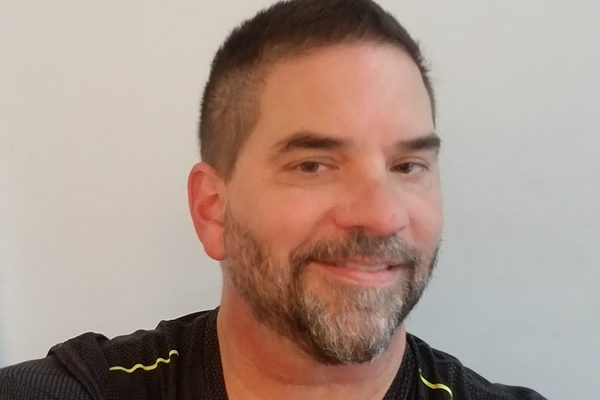
Congratulations also to Dionne Bussey-Reeder who began her new position as executive director of the Far Southeast Family Strengthening Collaborative on Oct. 1. The Far Southeast Family Strengthening Collaborative, Inc. (FSFSC) was formally established in April 1996 through a Neighborhood Collaborative Capacity Grant made possible through the federal Family Preservation and Support Act. FSFSC is organized as a partnership of residents, agencies, government bodies, and institutions located in and/or doing business in the Southeast community. They are a member of the citywide Healthy Families Thriving Communities Collaborative, a network of all the collaboratives, and a member in good standing of the joint policy body, the Collaborative partnership.
Bussey-Reeder is a businesswoman, community organizer and non-profit executive. Upon accepting the position she said, “I am blessed to have an opportunity to lead this great organization that began 23 years ago with the idea that giving neighbors a small hand up could change their lives forever. That spirit is evident each day as the collaborative’s employees work tirelessly to provide housing, direct services and support to the people and community organizations in Ward 8. As I follow in the footsteps of my good friend Perry Moon, we thank him for doing a great job. Together with the Board of Directors and our awesome staff, we will build on our past successes and never lose sight of the fact that our work and our mission makes a profound impact on the daily lives of residents in Ward 8.”
Dionne owned a cafe in Anacostia, Cheers at the Big Chair. She is a native Washingtonian who grew up in Ward 1. She has been active in D.C. politics including having been a Neighborhood Services Coordinator in the Williams’ administration. Last year she ran against Elissa Silverman for an at-large seat on the City Council. She and her wife, whom she met more than 20 years ago, now have a five-year old granddaughter. Bussey-Reeder is a graduate of West Virginia State University.
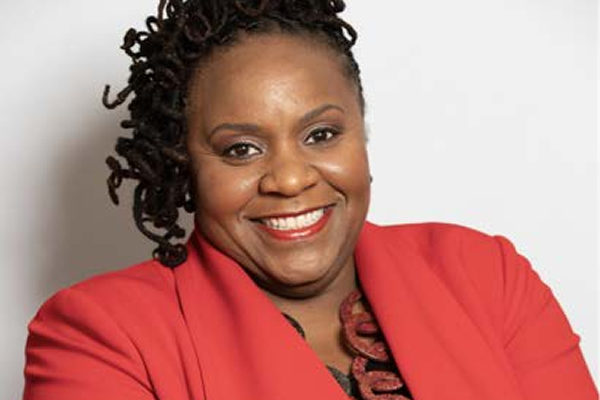

In an official statement released at the reveal event Capital Pride Alliance described its just announced 2026 Pride theme of “Exist, Resist, Have the Audacity” as a “bold declaration affirming the presence, resilience, and courage of LGBTQ+ people around the world.”
The statement adds, “Grounded in the undeniable truth that our existence is not up for debate, this year’s theme calls on the community to live loudly and proudly, stand firm against injustice and erasure, and embody the collective strength that has always defined the LGBTQ+ community.”
In a reference to the impact of the hostile political climate, the statement says, “In a time when LGBTQ+ rights and history continue to face challenges, especially in our Nation’s Capital, where policy and public discourse shape the future of our country, together, we must ensure that our voices are visible, heard, and unapologetically centered.”
The statement also quotes Capital Pride Alliance CEO and President Ryan Bos’s message at the Reveal event: “This year’s theme is both a declaration and a demand,” Bos said. “Exist, Resist, Have Audacity! reflects the resilience of our community and our responsibility to protect the progress we’ve made. As we look toward our nation’s 250th anniversary, we affirm that LGBTQ+ people have always been and always will be part of the United States’s history, and we will continue shaping its future with strength and resolve,” he concluded.
District of Columbia
Capital Pride board member resigns, alleges failure to address ‘sexual misconduct’
In startling letter, Taylor Chandler says board’s inaction protected ‘sexual predator’

Taylor Lianne Chandler, a member of the Capital Pride Alliance Board of Directors since 2019 who most recently served as the board’s secretary, submitted a letter of resignation on Feb. 24 that alleges the board has failed to address instances of “sexual misconduct” within the Capital Pride organization.
The Washington Blade received a copy of Chandler’s resignation letter one day after she submitted it from an anonymous source. Chandler, who identifies as transgender and intersex, said in an interview that she did not send the letter to the Blade, but she suspected someone associated with Capital Pride, which organizes D.C.’s annual LGBTQ Pride events, “wants it out in the open.”
“It is with a heavy heart, but with absolute clarity, that I submit my resignation from the Capital Pride Alliance Board of Directors effective immediately,” Chandler states in her letter. “I have devoted nearly ten years of my life to this organization,” she wrote, pointing to her initial involvement as a volunteer and later as a producer of events as chair of the organization’s Transgender, Gender Non-Conforming, and Intersex Committee.
“Capital Pride once meant something profound to me – a space of safety, visibility, and community for people who have often been denied all three,” her letter continues. “That is no longer the organization I am part of today.”
“I, along with other board members, brought forward credible concerns regarding sexual misconduct – a pattern of behavior spanning years – to the attention of this board,” Chandler states in the letter. “What followed was not accountability. What followed was retaliation. Rather than addressing the substance of what was reported, officers and fellow board members chose to chastise those of us who came forward.”
The letter adds, “This board has made its priorities clear through its actions: protecting a sexual predator matters more than protecting the people who had the courage to come forward. … I have been targeted, bullied, and made to feel like an outsider for doing what any person of integrity would do – telling the truth.”
In response to a request from the Blade for comment, Anna Jinkerson, who serves as chair of the Capital Pride board, sent the Blade a statement praising Taylor Chandler’s efforts as a Capital Pride volunteer and board member but did not specifically address the issue of alleged sexual misconduct.
“We’re also aware that her resignation letter has been shared with the media and has listed concerns,” Jinkerson said in her statement. “When concerns are brought to CPA, we act quickly and appropriately to address them,” she said.
“As we continue to grow our organization, we’re proactively strengthening the policies and procedures that shape our systems, our infrastructure, and the support we provide to our team and partners,” Jinkerson said in her statement. “We’re doing this because the community’s experience with CPA must always be safe, affirming, empowering, and inclusive,” she added.
In an interview with the Blade, Chandler said she was not the target of the alleged sexual harassment.
She said a Capital Pride investigation identified one individual implicated in a “pattern” of sexual harassment related behavior over a period of time. But she said she was bound by a Non-Disclosure Agreement (NDA) that applies to all board members and she cannot disclose the name of the person implicated in alleged sexual misconduct or those who came forward to complain about it.
“It was one individual, but there was a pattern and a history,” Chandler said, noting that was the extent of what she can disclose.
“And I’ll say this,” she added. “In my opinion, with gay culture sometimes the touchy feely-ness that goes on seems to be like just part of the culture, not necessarily the same as a sexual assault or whatever. But at the same time, if someone does not want those advances and they’re saying no and trying to push you away and trying to avoid you, then it makes it that way regardless of the culture.”
When asked about when the allegations of sexual harassment first surfaced, Chandler said, “In the past year is when the allegation came forward from one individual. But in the course of this all happening, other individuals came forward and talked about instances – several which showed a pattern.”
Chandler’s resignation comes about five months after Capital Pride Alliance announced in a statement released in October 2025 that its then board president, Ashley Smith, resigned from his position on Oct. 18 after Capital Pride became aware of a “claim” regarding Smith. The statement said the group retained an independent firm to investigate the matter, but it released no further details since that time. Smith has declined to comment on the matter.
When asked by the Blade if the Smith resignation could be linked in some way to allegations of sexual misconduct, Chandler said, “I can’t make a comment one way or the other on that.”
Chandler’s resignation and allegations come after Capital Pride Alliance has been credited with playing the lead role in organizing the World Pride celebration hosted by D.C. in which dozens of LGBTQ-related Pride events were held from May through June of 2025.
The letter of resignation also came just days before Capital Pride Alliance’s annual “Reveal” event scheduled for Feb. 26 at the Hamilton Hotel in which the theme for D.C.’s June 2026 LGBTQ Pride events was to be announced along with other Pride plans.
District of Columbia
Capital Stonewall Democrats elect new leaders
LGBTQ political group set to celebrate 50th anniversary

Longtime Democratic Party activists Stevie McCarty and Brad Howard won election last week as president and vice president for administration for the Capital Stonewall Democrats, D.C.’s largest local LGBTQ political organization.
In a Feb. 24 announcement, the group said McCarty and Howard, both of whom are elected DC Advisory Neighborhood Commissioners, ran in a special Capital Stonewall Democrats election to fill the two leadership positions that became vacant when the officers they replaced resigned.
Outgoing President Howard Garrett, who McCarty has replaced, told the Washington Blade he resigned after taking on a new position as chair of the city’s Ward 1 Democratic Committee. The Capital Stonewall Democrats announcement didn’t say who Howard replaced as vice president for administration.
The group’s website shows its other officers include Elizabeth Mitchell as Vice President for Legislative and Political Affairs, and Monica Nemeth as Treasurer. The officer position of secretary is vacant, the website shows.
“As we look toward 2026, the stakes for D.C. and for LGBTQ+ communities have never been clearer,” the group’s statement announcing McCarty and Howard’s election says. “Our 50th anniversary celebration on March 20 and the launch of our D.C. LGBTQ+ Voter’s Guide mark the beginning of a major year for endorsements, organizing, and coalition building,” the statement says.
McCarty said among the organization’s major endeavors will be holding virtual endorsement forums where candidates running for D.C. mayor and the Council will appear and seek the group’s endorsement.
Founded in 1976 as the Gertrude Stein Democratic Club, the organization’s members voted in 2021 to change its name to Capital Stonewall Democrats. McCarty said the 50th anniversary celebration on March 20, in which D.C. Mayor Muriel Bowser and members of the D.C. Council are expected to attend, will be held at the PEPCO Gallery meeting center at 702 8th St., N.W.

